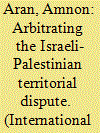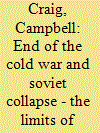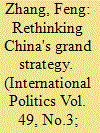| Srl | Item |
| 1 |
ID:
113621


|
|
|
|
|
| Publication |
2012.
|
| Summary/Abstract |
Breaking the current deadlock in the Israeli/Palestinian conflict has thus far proved impossible. However, the suggestion that arbitration should replace negotiations is flawed.
|
|
|
|
|
|
|
|
|
|
|
|
|
|
|
|
| 2 |
ID:
113620


|
|
|
|
|
| Publication |
2012.
|
| Summary/Abstract |
William Wohlforth and Daniel Deudney and John Ikenberry provide strong Realist and Liberal analyses, respectively, of the End of the Cold War. Both interpretations, however, beg larger conceptual and historical questions, which cannot be answered without making the nuclear revolution central to explaining Soviet collapse.
|
|
|
|
|
|
|
|
|
|
|
|
|
|
|
|
| 3 |
ID:
113617


|
|
|
|
|
| Publication |
2012.
|
| Summary/Abstract |
Since 9/11, counter-terrorism officials have fretted over the possibility of jihadist terrorists obtaining and deploying a nuclear weapon. Although acknowledging that such anxieties are well grounded, I offer here a reconceptualisation of the jihadist terrorist nuclear threat that focuses alternatively upon the remote but real possibility that jihadist terrorists may seek to advance their goals by trying to provoke an Indo-Pakistani nuclear confrontation. Such a confrontation would serve jihadist goals by aggravating religious polarisation on the sub-continent while dramatically weakening the Pakistani state. The system-destabilising consequences of such a catastrophe would likely also offer the jihadists their best opportunity to revive their faltering movement, which otherwise appears fated to terminal decline. In the light of this assessment, I argue that a higher priority must be accorded towards strengthening Indo-Pakistani crisis stability and advancing regional reconciliation if the risk of a jihadist-provoked nuclear exchange is to be minimised.
|
|
|
|
|
|
|
|
|
|
|
|
|
|
|
|
| 4 |
ID:
113619


|
|
|
|
|
| Publication |
2012.
|
| Summary/Abstract |
This article addresses the following two questions: First, how does the United States (US) manage regional war and peace, especially in the Middle East (ME)? It will show that the strategies the US has adopted in conflict management in the ME over the last several decades have shown considerable variations, both in the goals of its involvement - between trying to shape the regional balance of power and to reorder the domestic regimes in the regional states, and in the means of involvement - between a unilateral and a multilateral strategy. Second, it seeks to explain these variations in the US regional patterns of involvement.
|
|
|
|
|
|
|
|
|
|
|
|
|
|
|
|
| 5 |
ID:
113618


|
|
|
|
|
| Publication |
2012.
|
| Summary/Abstract |
The question of China's grand strategy is of great importance for understanding the international impact of China's rise. Both Western and Chinese scholars dispute whether China has developed a coherent grand strategy in the reform era. The main reason for the controversy seems to lie as much in theoretical and methodological assumptions about defining and analyzing grand strategy as in empirical validity. This article contributes to the debate by adopting a novel theoretical approach to analyzing grand strategy by seeing it as the conjunction of national interests and strategic ideas. It examines China's evolving national interests and strategic ideas in the reform period in order to clarify the exploratory, evolutionary and adaptive nature of policy change. China cannot be said to have developed a premeditated grand strategy during this period. Even though one may still be able to rationalize elements of China's foreign policies into a grand strategy, it comes at the cost of missing their changing nature.
|
|
|
|
|
|
|
|
|
|
|
|
|
|
|
|